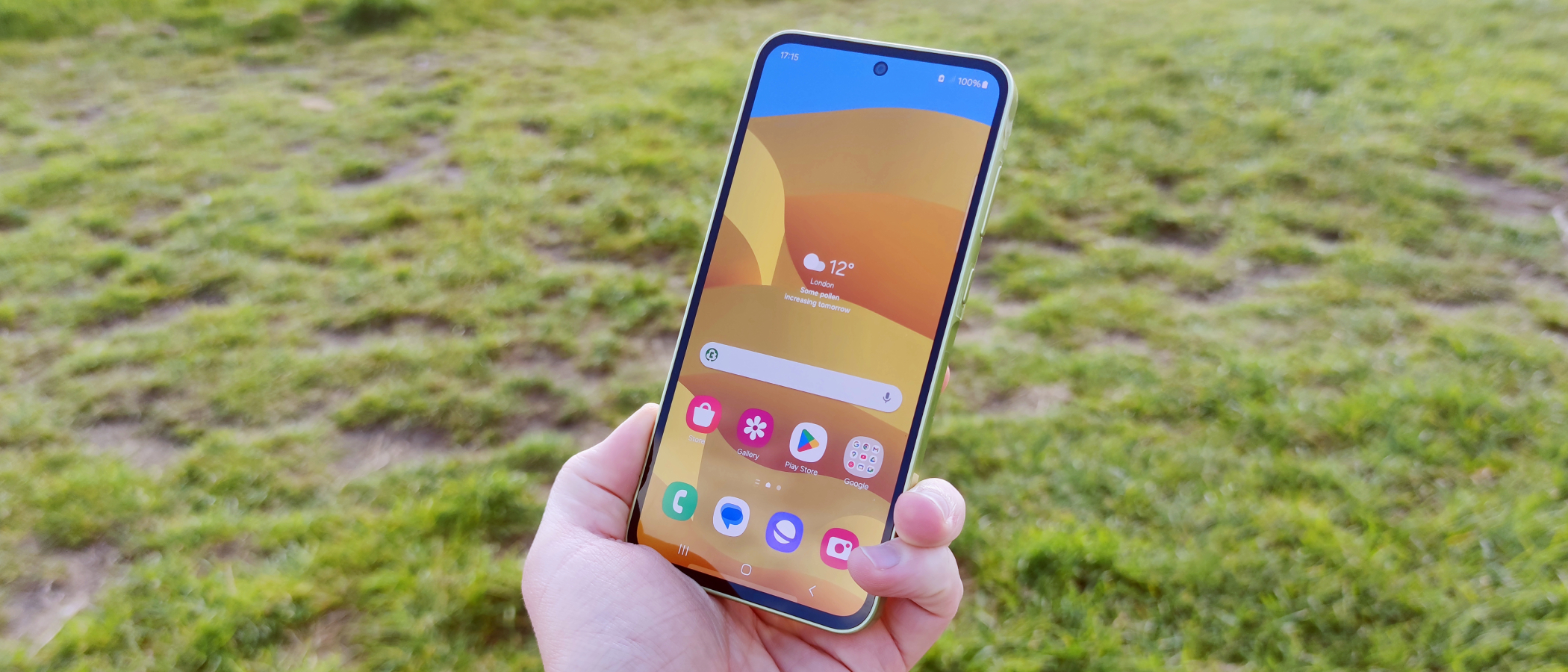TechRadar Verdict
The Samsung Galaxy A35 exceeds its price tag with a great-looking display, impressive gaming performance and highly customizable software. The phone exhibits its mid-range status almost everywhere else, but it still justifies itself as a commendable, low-cost Galaxy S24 alternative.
Pros
- +
Good-looking display
- +
Valiant chipset
- +
Handy software tricks
Cons
- -
Slow charging
- -
Unimpressive cameras
- -
Unresponsive fingerprint scanner
Why you can trust TechRadar
Samsung Galaxy A35 two-minute review
The Samsung Galaxy A35 is a smartphone designed for people who want the finest tech from South Korea’s favorite phone company, but can’t stomach the hefty price tag often demanded by the best Samsung phones.
By ‘finest tech’ I of course refer to the Samsung Galaxy S24 series, Sammy’s recent line of flagship phones, which come with a cost that's north of my monthly rent. Thankfully, people who prefer their cheap phones can still enjoy some of the best Galaxy tech thanks to the A35.
If you’re new to the Galaxy A range, it’s Samsung’s step-down line compared to the flagship Galaxy S range (though not as far down as the M or J series, available in some countries). The ‘3’ in the title refers to the phone’s place in the sliding scale of premiumness – ‘0’ is super-cheap, and higher numbers get incrementally better – while the ‘5’ tells you that this is part of the fifth generation of Galaxy A mobiles (well, at least since Samsung started this numbering system).
These handsets all borrow specific bits of Samsung tech from the company's top-end mobiles, while otherwise presenting an affordable package with corners cut to keep the price low. And the Galaxy A35 is another great example of that strategy.
Samsung’s fantastic display tech is shining brightly on the Galaxy A35: the screen is big, bold, bright, vibrant, and other synonyms for ‘nice to look at’. If you consider your phone to be a glorified Netflix, Prime Video or Disney Plus-streaming device, then the Galaxy A35 will tick your box.
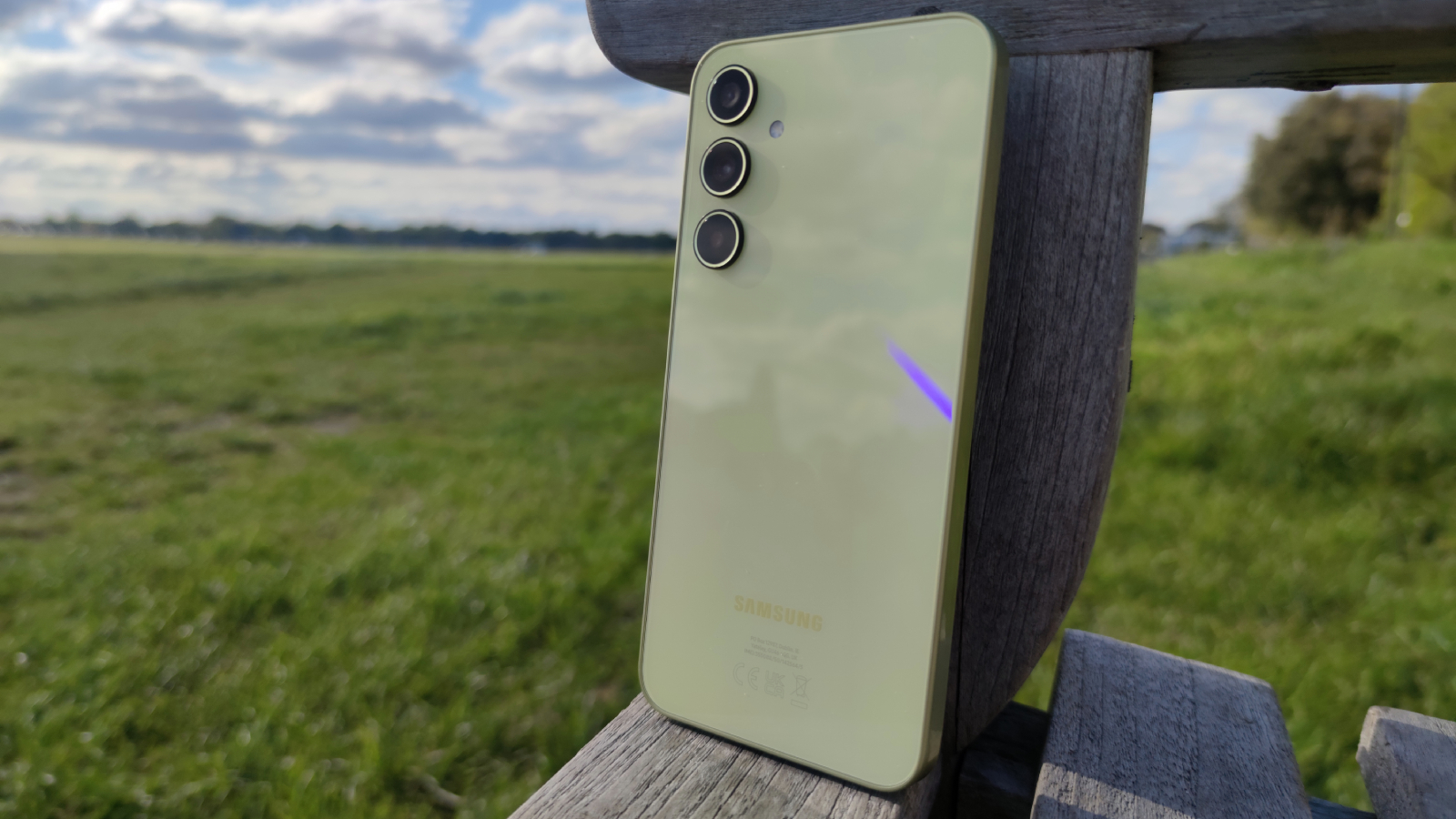
You’re getting all of Samsung’s popular OneUI software here, with its customization tools, programmable routines and the colorful, fun user interface. You’re also getting its bloatware, as it’s not just stuffed with Samsung and Google apps, but also some choice third-party ones, too.
The chipset is a surprising feature: on paper, it’s just a bog-standard, low-end Samsung chip, but it absolutely cracks through long gaming bouts or intensive tasks; mobile gamers won’t find anything to turn their nose up at here.
Sign up for breaking news, reviews, opinion, top tech deals, and more.
It’s not a perfect phone, though, even by Galaxy A standards. The cameras are a prime example, as they just don’t hold a candle to those on other models I’ve tested. Low-light snaps were vibrant enough, but odd scene optimization AI edits and questionable ultra-wide performance marred the results.
The trappings of low-end mobiles are here in some respects, too: charging is slow, the design is a bit utilitarian and the fingerprint sensor is just awful. Stick to facial unlocking or a PIN/password if you buy this device.
Still, there’s nothing on this phone that’s outright disappointing when you consider its price, and a fair few features are actually better than you’d expect. All told, then, you’re not going to be left feeling mugged off if you buy the Galaxy A35.
Samsung Galaxy A35 review: price and availability
- Released in March 2024
- On sale in the US, UK and Australia, among other regions
- $399.99 / £339.99 / AU$549.99, only one variant
The Samsung Galaxy A35 was announced in March 2024 and released shortly thereafter, as part of the company’s 2024 line of budget smartphones.
You can pick up the device for $399.99 / £339.99 / AU$549.99 in its sole 128GB configuration, though you can pick between a few color options if you want some amount of customization.
At that price, this is a worthy budget alternative to the $799 / £799 / AU$1,399 Samsung Galaxy S24, getting you a few specs and features pinched from the premium mobiles, but at a much lower price.
It’s not Samsung’s cheapest phone, with the Galaxy A0X, A1X and A2X lines all offering cheaper options, though almost all of those devices have specs weak enough to make them not worth considering (with the exception of the Samsung Galaxy A25).
Samsung Galaxy A35 review: specs
The Samsung Galaxy A35 has specs that run the gamut from low-end to top-end, which you can see below:
| Header Cell - Column 1 | |
|---|---|
| Dimensions: | 161.7 x 78 x 8.2mm |
| Weight: | 209g |
| Screen: | 6.6-inch 19.5:9 FHD (1080x2340) 120Hz Super AMOLED |
| Chipset: | Exynos 1380 |
| RAM: | 6GB |
| Storage: | 128GB |
| OS: | Android 14, OneUI 6.1 |
| Primary camera: | 50MP, f/1.8 |
| Ultra-wide camera: | 8MP f/2.2 |
| Macro camera: | 5MP, f/2.4 |
| Front camera: | 16MP, f/2.4 |
| Audio: | Stereo speakers |
| Battery: | 5,000mAh |
| Charging: | 25W wired |
| Colors: | Awesome Lemon, Awesome Iceblue, Awesome Lilac, Awesome Navy |
Samsung Galaxy A35 review: design
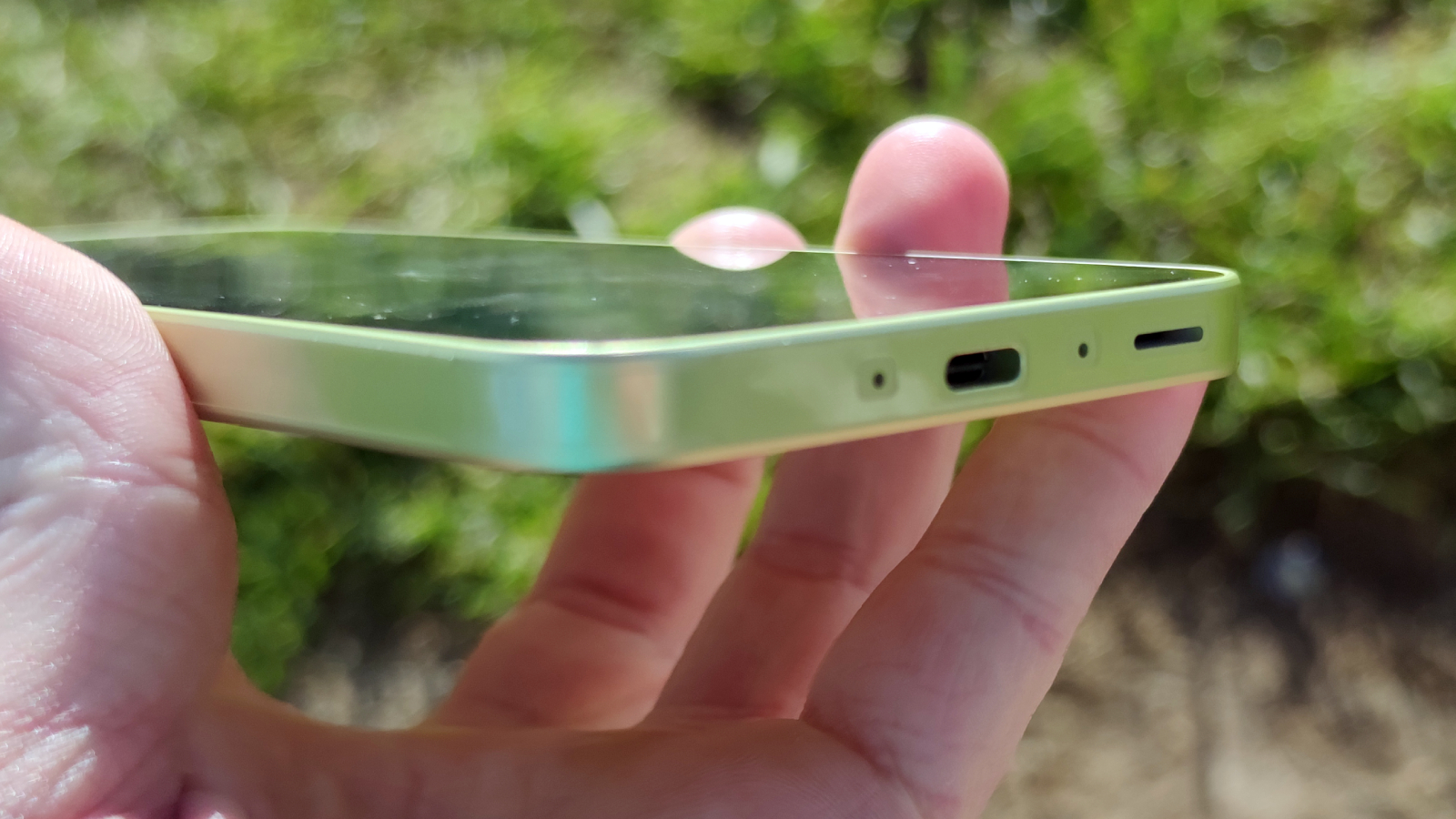
- Standard-looking chocolate bar Android phone
- Color options vary by region
- Fingerprint scanner is unreliable
Samsung hasn’t exactly been changing things between its Galaxy A-series mobiles of late, and the Galaxy A35 is certainly no exception. It’s your standard chocolate bar smartphone with a fairly large body and a flat edge.
The handset weighs 209g, so it’s roughly average as mobiles go, and it measures 161.7 x 78 x 8.2mm, which is a little on the hefty side but not as big as Samsung’s ‘Ultra’ phones. It’s noticeably bigger than the S24, though.
The Galaxy A35 has a glass front and back, making it feel more premium in the hand than many other mid-range phones. It ships in a range of color options, too, but those options depend on region: US buyers can pick between navy and lilac, Australian customers can choose navy or pale blue, and UK buyers get all three of those options, as well as the fetching pale yellow that you see in the images accompanying this review. All these colors are relatively restrained given the vibrancy of some of Samsung’s previous Galaxy A color options.
Unlike some of its cheaper A-series siblings, the Galaxy A35 doesn’t have a 3.5mm headphone jack. Instead, its only port is the USB-C one on the bottom edge of the device.
Both the volume rocker and power button are on the right edge of the device, and you may find yourself stretching to reach them unless you have big mitts.
Samsung uses an under-display fingerprint sensor for the phone, but you’d be forgiven for not noticing — that is to say, it failed to find my finger more often than it succeeded, and I ended up having to type my password in far more often than on most other mobiles.
The phone is certified with an IP67 rating, which means it’s totally protected from small particles (sand, dust, flour and the like) and will also survive being submersed in liquid at a depth of up to 1 meter for a limited time – don’t take it swimming, then, but it should still work if you accidentally drop it in your beer.
- Design score: 3 / 5
Samsung Galaxy A35 review: display
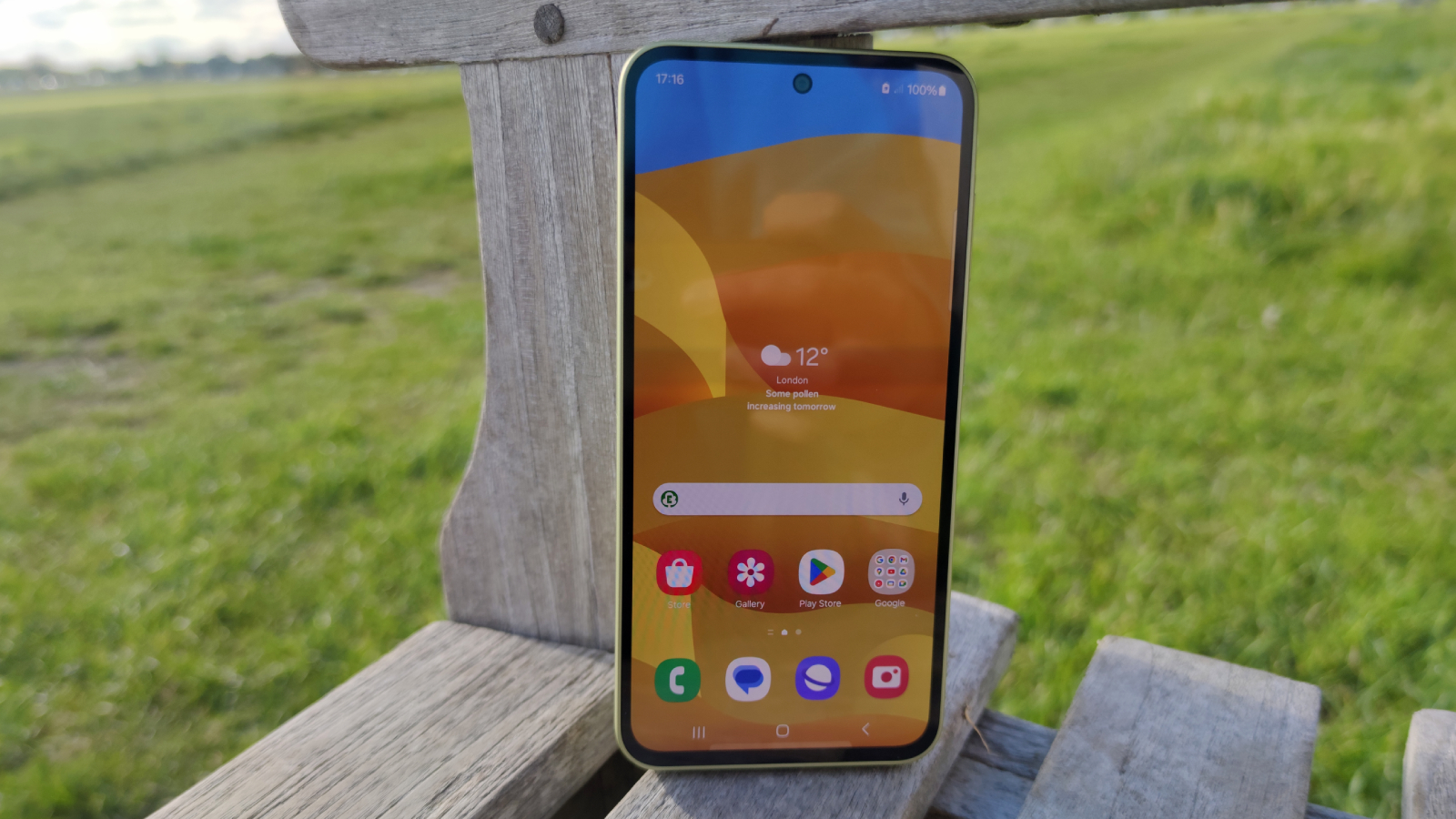
- 6.6-inches with 1080 x 2340 resolution
- Super AMOLED results in punchy visuals
- 120Hz refresh rate for smooth scrolling
If any part of the Samsung Galaxy A35 will make you forget that you’re using a budget mobile, it’s the display.
The phone boasts a big 6.6-inch display, which is bigger than most Galaxy A-series mobiles and also the Galaxy S24. It has a 1080 x 2340 resolution, which is the same as most mobiles on the market, and a 19.5:9 aspect ratio.
Anyone who’s used a Samsung phone will know that the company’s tech is strongest in the display department; this mobile uses a Super AMOLED panel with a fairly high max brightness of 1000 nits. The screen is bright and colors pop, enhancing that Netflix stream or gaming session.
Even your average scrolling experience is better on the Galaxy A35 thanks to its 120Hz refresh rate, which makes motion look smoother and is far from a given on phones in this price range (heck, even the iPhone 15 doesn't have a 120Hz refresh rate).
- Display score: 4 / 5
Samsung Galaxy A35 review: software
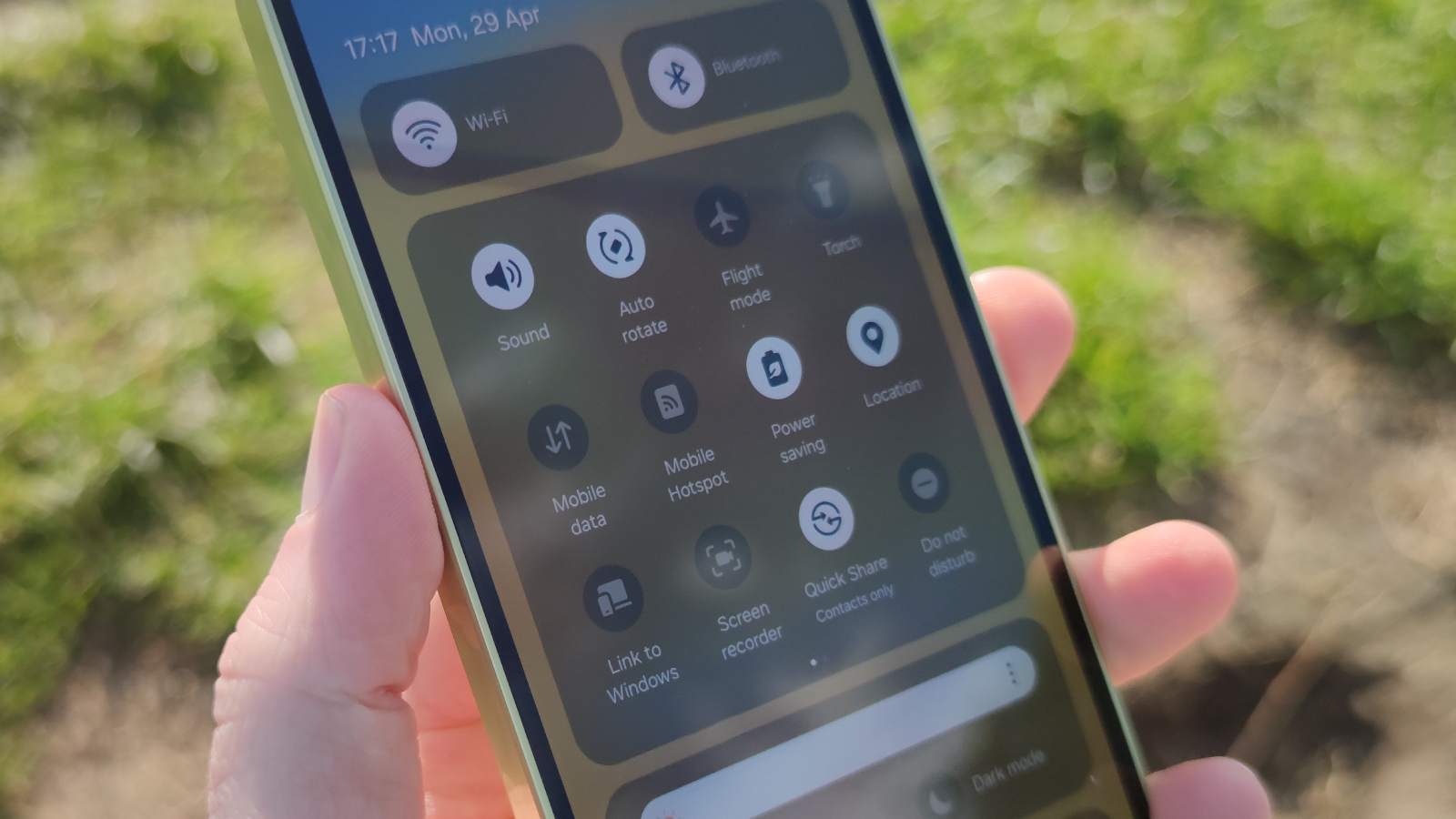
- Android 14 with One UI 6.1 over the top
- Customization and routines good, bloatware bad
- Four years of OS updates, five of security
A major similarity between the Samsung Galaxy A35 and its Galaxy S24 brethren is in the software department: both come with Android 14 pre-installed, with Samsung’s One UI 6.1 slathered over the top.
Samsung has promised four years of software updates, taking you up to Android 18 (unless Google decides to get funky with numerical orders) and you get an extra year of security updates on top of that.
Visually speaking, One UI is one of the more distinctive Android forks, offering pebble-shaped icons, colorful menus and easy-to-parse icons in the quick settings menu. However, between the Samsung apps, Google apps and a fair few third-party apps, the Galaxy A35 is also chock-full of bloatware, which is something you’d think a massive company like Samsung would be above.
One UI brings plenty of customization options with widgets for your installed apps, a wide range of pre-installed wallpapers, the ability to pick a system-wide color palette, and more. The options here aren’t quite as extensive as on, say, Motorola or stock Android phones, but it’s something.
Like on iPhones, Samsung offers a handy ‘Modes and Routines’ feature so you can jump between, say, sleep, driving or workout modes at the tap of a button, which lets you completely change the way your phone works if you need different settings for a temporary amount of time. These options do require some set-up, though, so carve 15 minutes out of your schedule when you first buy the phone to set them up.
- Software score: 3.5 / 5
Samsung Galaxy A35 review: cameras
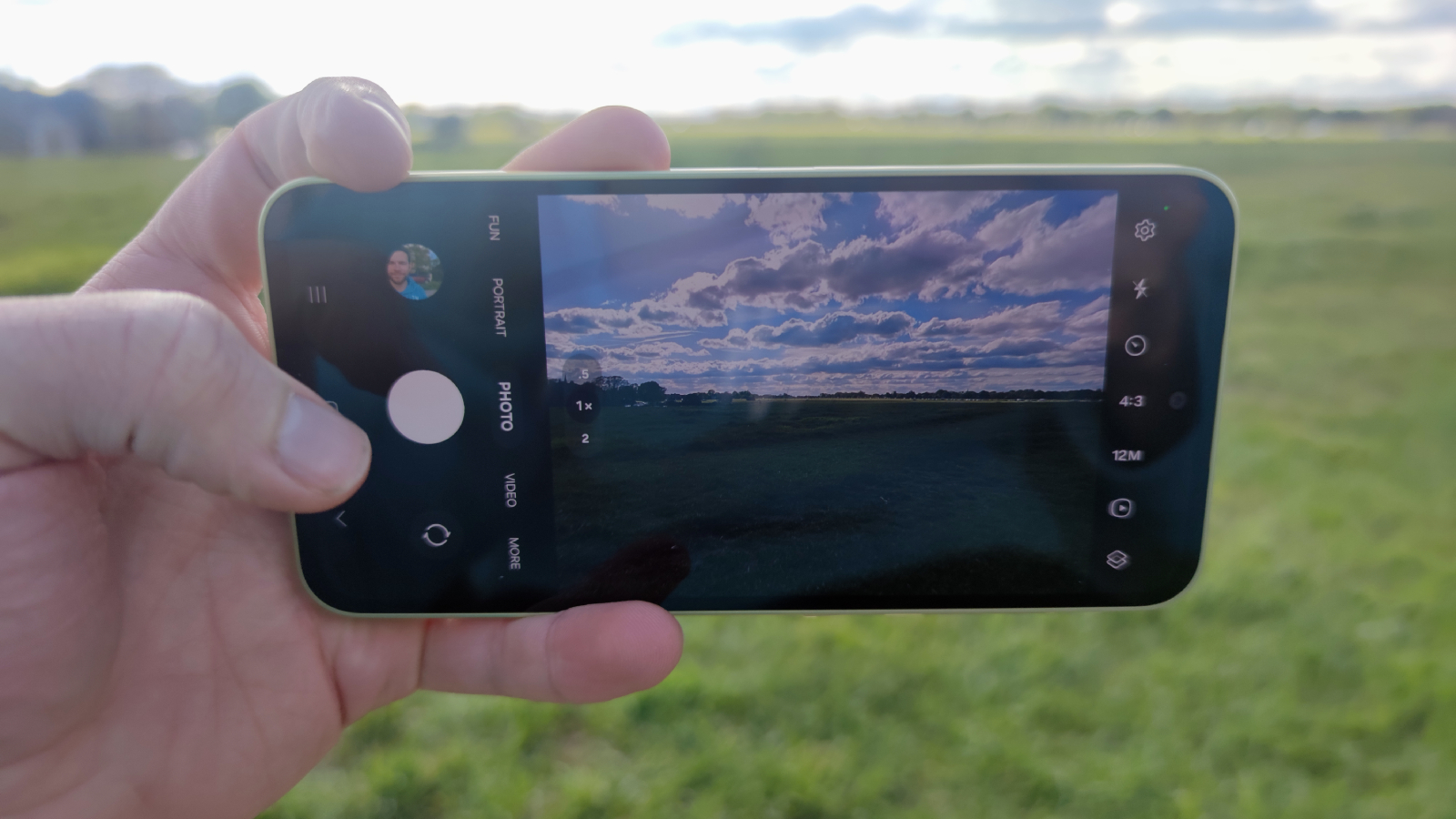
- 50MP main, 8MP ultra-wide and 5MP macro cameras
- 13MP selfie camera on front
- Range of extra photography and video modes
You’re looking at three rear cameras on the Samsung Galaxy A35. They create a package that’s par for the course for a mid-range phone at this budget, but won’t hold a candle to the Galaxy S24 range or even higher-priced Galaxy A mobiles.
The leader of the pack is a 50MP f/1.8 main camera, which is joined by a 8MP f/2.2 ultra-wide snapper, with a 5MP f/2.4 macro rounding out the trio.
In well-lit conditions, the main camera takes bright and colorful pictures, which made pictures of close items like flowers or food look bold. That's likely due to Samsung’s scene optimization AI processing, which is a staple of Galaxy phones. This feature adds some pep and pizazz to your snaps; and by that I mean it ratchets up the contrast and saturation, and also drizzles in some sharpening and HDR.
Seasoned photographers might find this tweakery unwanted, but seasoned photographers probably aren’t using this kind of phone. The optimization is most welcomed for snappy social media posts and selfies.
Why did I specify ‘close items’ before? Well, for wider shots, pixel binning seems to result in a noticeable lack of quality, which you can see in the picture of a tree in the camera samples section below.
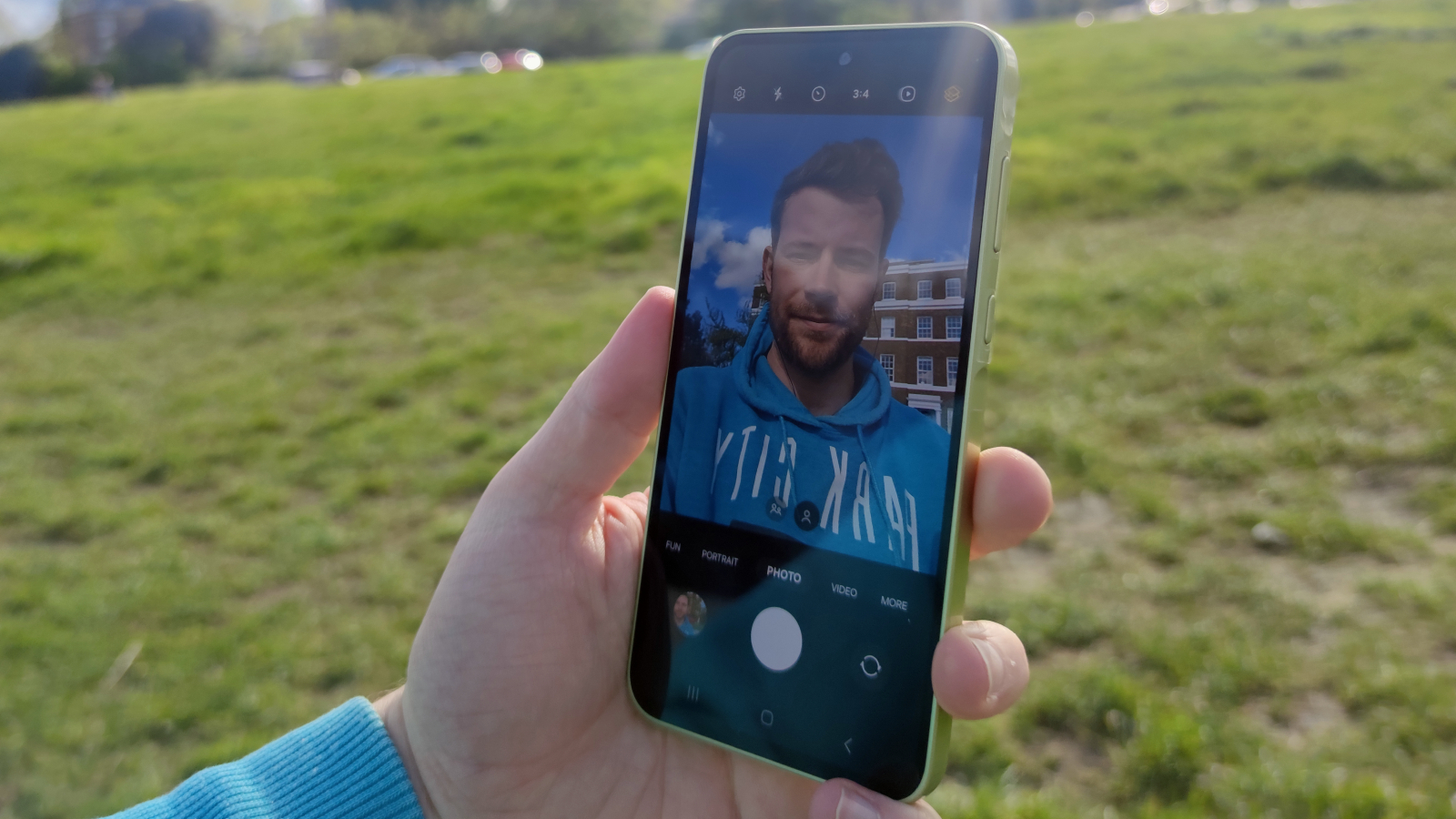
The Galaxy A35 also struggled in lower-lighting conditions, with details lost and contrast handled about as well as you’d expect. Sometimes scene optimization decided to cast an odd blue pall over snaps – a picture of some ducks below was taken in overcast conditions, yet looks like a cheap TV-movie day-for-night.
The camera will suit you better if you usually take pictures of close-up subjects (including people) in decently-lit environments, rather than wider landscapes at darker times of day.
The Achilles’ heel of the phone’s camera array is the ultra-wide snapper, because photos taken on it looked dull and lifeless compared to their counterparts. It’s as though the AI scene optimization forgot to step in!
Rounding out the trio is the macro camera, which is a lot more situational in use than its siblings; it’s used for those close-up photos that the main camera will struggle to keep in focus. It’s up to the task, but you probably won’t be using this camera too much if you can help it.
On the front of the phone is a 13MP f/2.2 selfie camera, and everything I said about the rear camera’s optimization is out here in force, with the added distinction that the subject of a selfie is generally going to be close to the camera, so no landscape-shot woes here. There’s nothing wrong with nice bright selfies though, and in Portrait mode the device was fab at blurring the background and balancing the elements of the picture to create a great-looking shot.
Video recording goes up to 4K at 30fps or FHD at 60fps, or goes very low with several slow-mo modes. Most of the modes here are par for the course for a modern-day smartphone, with night, time-lapse and Portrait modes present and correct. Samsung stalwart modes Food (which ramps the saturation up for a very limited focus area) and Fun (which adds AR effects on human subjects) are back here, too.
Samsung Galaxy A35 camera samples



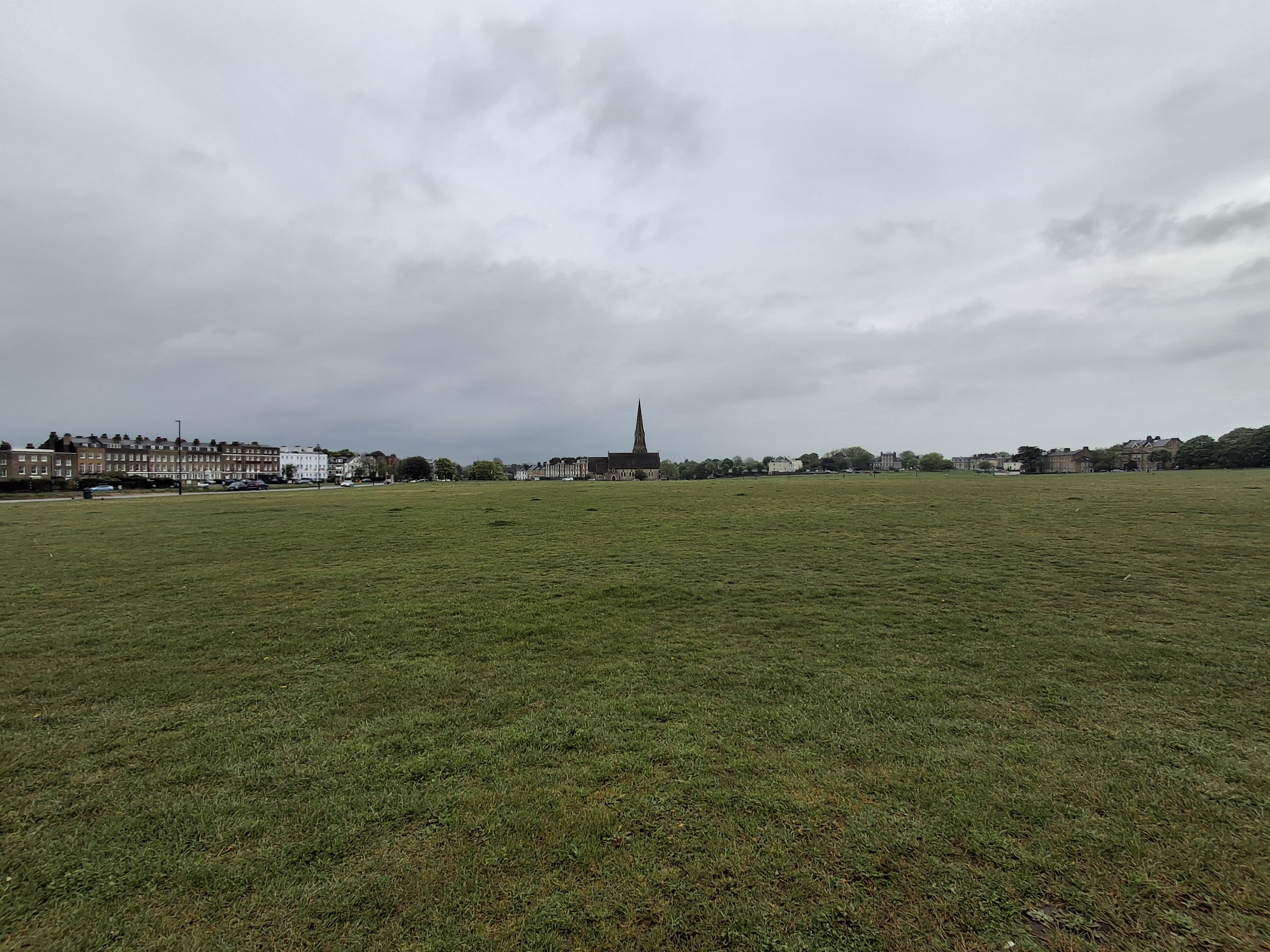




- Camera score: 3 / 5
Samsung Galaxy A35: performance and audio
- Snapdragon 695 is fit for purpose
- 128GB storage can be expanded up to 1TB, plus 4GB RAM
- 3.5mm headphone jack for wired audio
The ‘brains’ of the Samsung Galaxy A35’s operation is Samsung’s own Exynos 1380 chipset, which Samsung previously used in the pricier Galaxy A54 from last year.
In a Geekbench 5 benchmark test, the Exynos 1380 returned an average multi-core score of 2,868; the warmer the phone was, the lower the result, with scores ranging from the low 2,900s when cool to the mid 2,700s when warm. I’ve seen phones with much more dramatic ranges than that, I just say this to contextualize the average score.
The high 2,000s is nothing to phone home about, but it’s more than enough for most everyday use cases, and the A35 performed admirably in real-world testing. It blitzed through many games of Call of Duty Mobile or PUBG Mobile without breaking a sweat (though it did warm up if I was pushing it), and it did so without significant lagging, bugging or any crashing. Mobile gamers on a budget won’t find anything to dislike here.
Similarly, the phone felt snappy and fast to navigate, which is something you hope for but can never guarantee with phones around this price.
There’s 6GB RAM and board and 128GB storage; if you want more space you’ll need to rely on cloud storage, as there’s no expandable memory.
With no 3.5mm headphone jack, you’ve got one less option for audio on the Galaxy A35. The stereo speakers are serviceable: I found them perfectly fine for CoD:M, but even cheap headphones are better for music. The Bluetooth is 5.3, which is a decent standard for reliable and power-economic connection. You can also use a USB-C to 3.5mm adaptor if you absolutely need wired music.
- Performance score: 3.5 / 5
Samsung Galaxy A35 review: battery life
- Chunky 5,000mAh battery
- Phone lasts a day of use, sometimes more
- 25W wired charging is slow
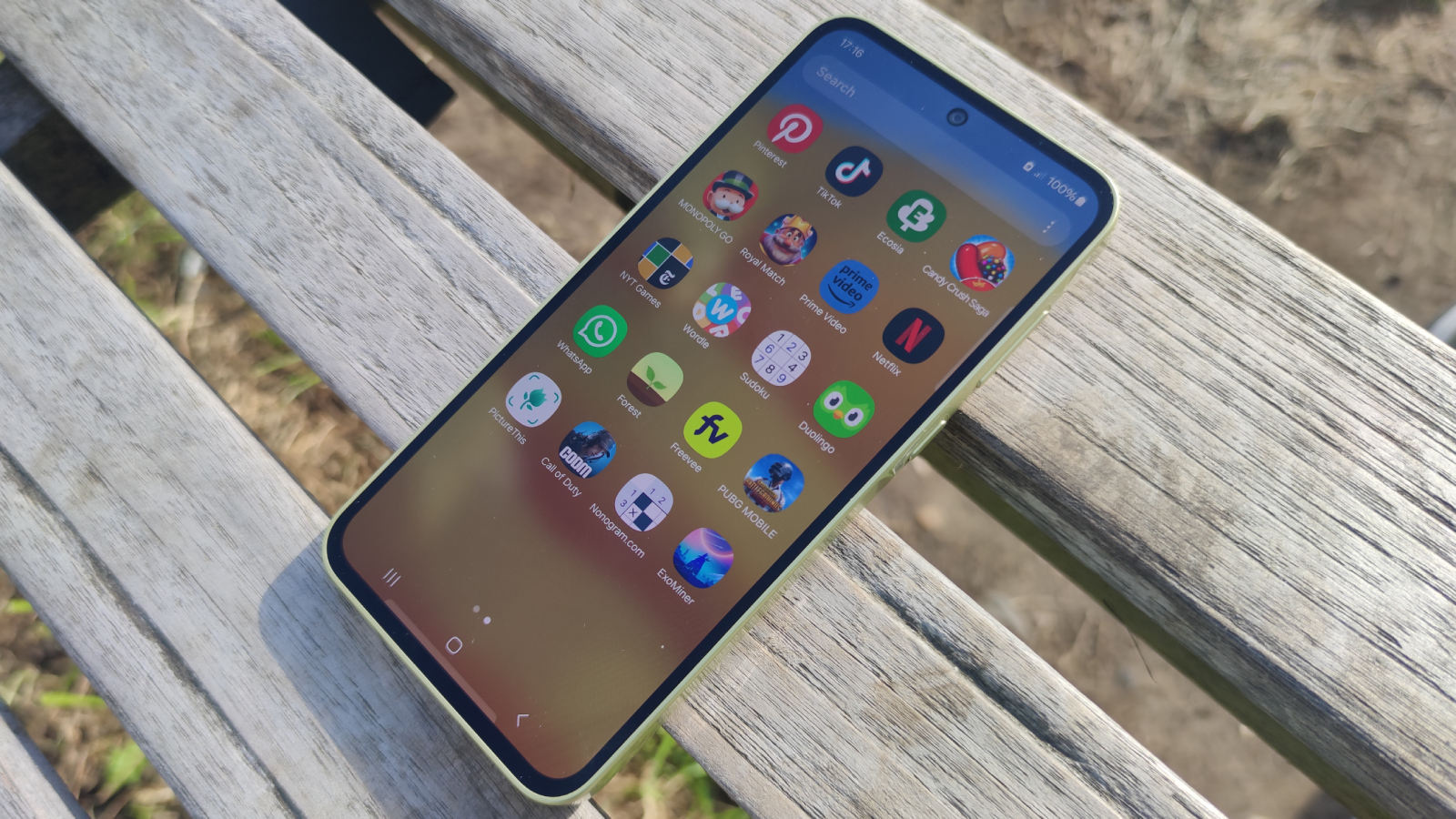
You’re looking at a 5,000mAh battery on the Samsung Galaxy A35, which is the same battery you'll find in the vast majority of other budget and mid-range mobiles (and some high-end ones, too).
In testing, that saw the phone comfortably last for a full day of use, despite the big bright screen and 5G connectivity. It limped until lunchtime on a second day before charging really became necessary, so I’d recommend charging daily.
Charging is done using the USB-C port, and it’s 25W, which isn’t exactly fast. At that speed, you’ll have to be tethered to the wall for over two hours, which nudges into ‘overnight charging’ territory.
There’s no wireless charging, but that’s no surprise when it comes to a mid-range mobile like the A35.
- Battery score: 3.5 / 5
Samsung Galaxy A35 review: value
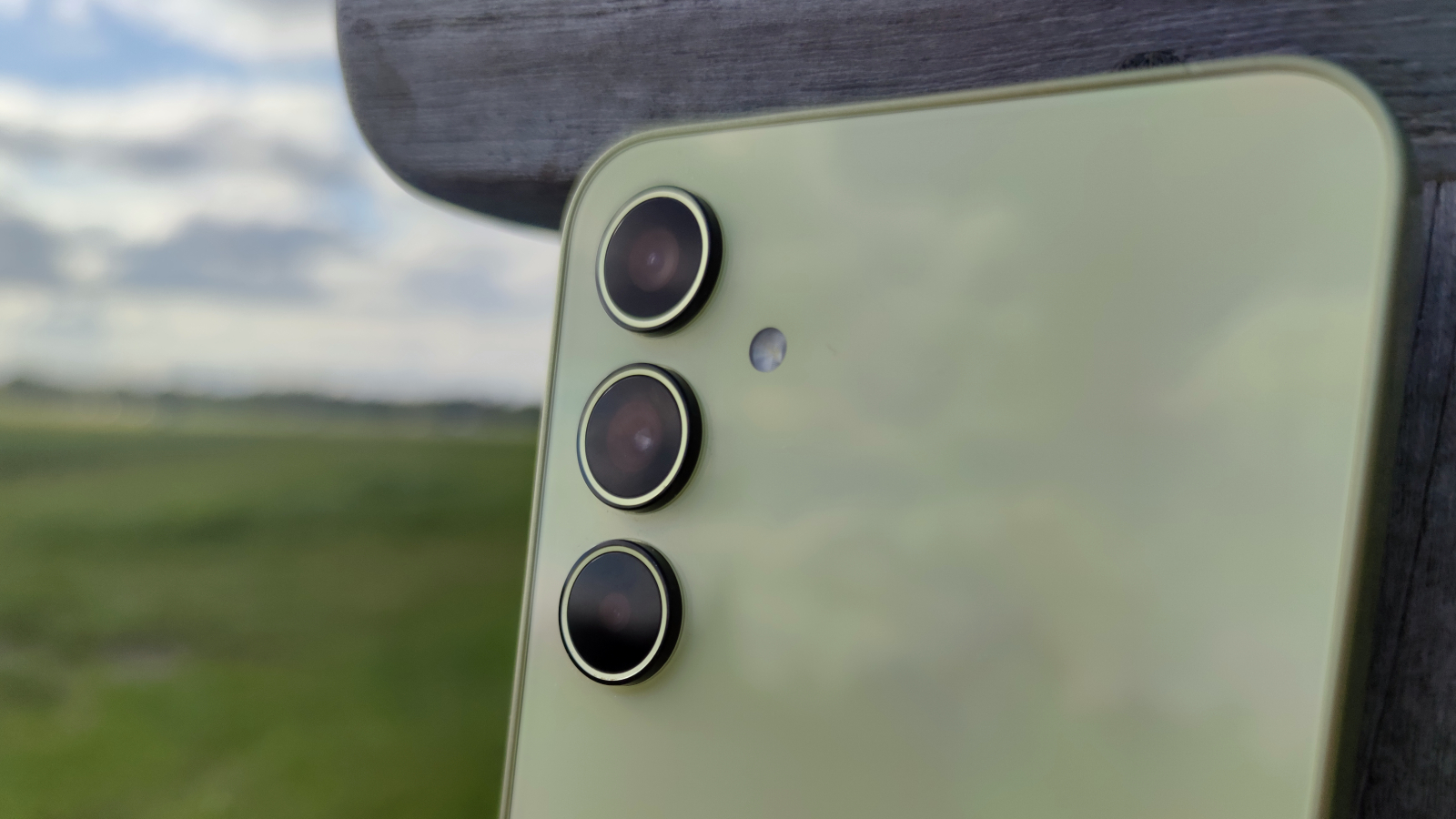
In many ways, the Samsung Galaxy A35 gives you exactly what you pay for, but you’re getting great value for money in a few distinct areas. I wasn’t kidding when I called this a budget Galaxy S24.
The display, software and performance all reach above the trappings of the A35’s low-mid-range price tier, giving you an experience that’s not quite ‘premium’, but is still more than you’d usually get for this price.
Plus, there’s no real department in which the Galaxy A35 falls below expectations: value all around.
- Value score: 4 / 5
Should you buy the Samsung Galaxy A35?
| Attributes | Notes | Rating |
|---|---|---|
| Value | A few areas exceed expectations, while most others match it. | 4 / 5 |
| Design | A generic Android phone in a few colors. | 3.5 / 5 |
| Display | A great-looking display for the price. | 4 / 5 |
| Software | One UI looks good with useful features; bloatware loses points. | 3.5 / 5 |
| Camera | A dab AI hand doesn't save some ungainly pictures. | 3 / 5 |
| Performance | Middling processing scores don't do justice to this phone's power. | 3.5 / 5 |
| Battery | A standard battery for a phone like this, with slow charging. | 3.5 / 5 |
Buy it if...
You watch lots of videos
The good-looking display on the Galaxy A35 makes it a dream for Netflix fans on a budget.
You're a gamer on a budget
The A35 is decently powerful for its price, but the big and attractive display ticks even more boxes.
You want One UI, without the price
You don't need to pay Galaxy S24 prices to use all of One UI's handy features, like routines and its customization options.
Don't buy it if...
You're a photography fan
The Galaxy A35's three cameras aren't going to impress amateur photographers much, especially with its overactive AI optimizations.
You need quick charging
You can buy budget phones with 120W charging, so the Samsung Galaxy A35's paltry 25W is slower than its rivals.
Your budget goes a little higher
Only a small fee will let you upgrade from the Galaxy A35 to the Galaxy A55, or another Samsung phone with improved features.
Samsung Galaxy A35 review: Also consider
If you're not certain on the Samsung Galaxy A35, here are some alternatives you might want to consider:
Samsung Galaxy A55
Small tweaks across the board make the Galaxy A55 a slight but worthwhile upgrade over the Galaxy A35, with a price that's only slightly higher.
Motorola Edge 50 Fusion
This premium-looking Moto phone undercuts the Galaxy A35 and has specs that match... except faster charging, a higher display refresh rate and a more premium chipset.
Google Pixel 8a
A slight budget increase will let you get the Pixel 8a with a fantastic camera, a compact body and nice, clean Stock Android software.
| Samsung Galaxy A35 | Samsung Galaxy A55 | Motorola Edge 50 Fusion | Google Pixel 8a | |
|---|---|---|---|---|
| Starting price (at launch): | $399.99 / £339.99 / AU$549.99 | £439 / AU$649 (roughly $500) | £349 (roughly $430, AU$660) | $499 / £499 / AU$849 |
| Dimensions: | 161.7 x 78 x 8.2mm | 161.1 x 77.4 x 8.2mm | 161.9 x 73.1 x 7.9mm | 152.1 x 72.7 x 8.9mm |
| Weight: | 209g | 213g | 174.9g | 188g |
| OS (at launch): | Android 14, One UI 6.1 | Android 14, One UI 6.1 | Android 14 | Android 14 |
| Screen Size: | 6.6-inch | 6.6-inch | 6.7-inch | 6.1-inch |
| Resolution: | 1080 x 2340 | 1080 x 2340 | 1080 x 2400 | 1080 x 2400 |
| CPU: | Exynos 1380 | Exynos 1480 | Snapdragon 7s Gen 2 | Google Tensor G3 |
| RAM: | 6GB | 6GB | 8GB / 12GB | 8GB |
| Storage (from): | 128GB | 128GB | 128GB / 256GB | 128GB / 256GB |
| Battery: | 5,000mAh | 5,000mAh | 5,000mAh | 4,492mAh |
| Rear Cameras: | 50MP main, 8MP ultra-wide. 5MP macro | 50MP main, 12MP ultra-wide. 5MP macro | 50MP main, 13MP ultrawide | 64MP main, 13MP ultra-wide |
| Front camera: | 13MP | 32MP | 32MP | 13MP |
How I tested the Samsung Galaxy A35
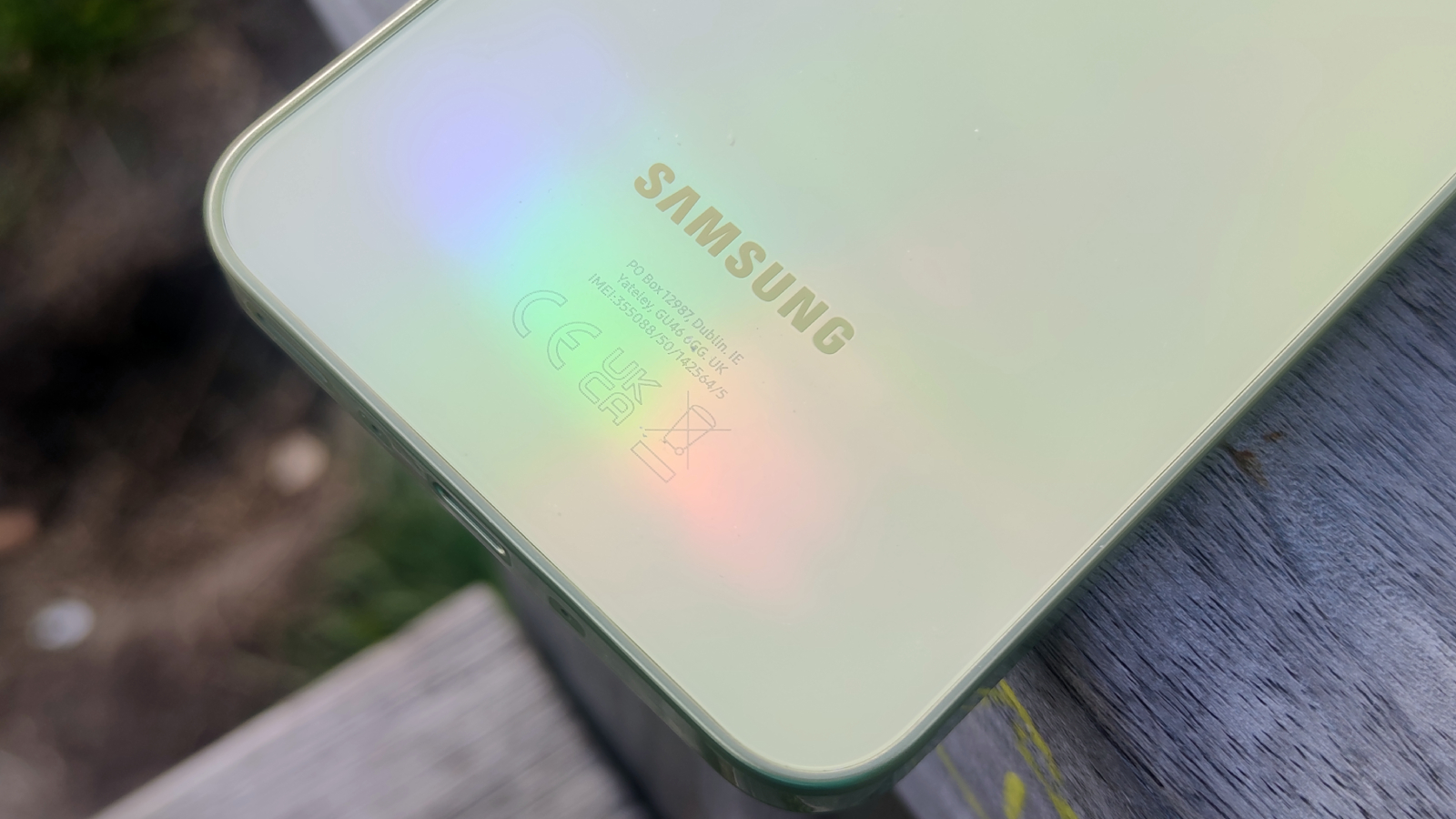
- Review test period = 2 week
- Testing included = Everyday usage, including web browsing, social media, photography, video calling, gaming, streaming video, music playback
- Tools used = Geekbench 6, Geekbench ML, GFXBench, native Android stats
I tested the yellow – sorry, 'Awesome Lemon' – version of the Samsung Galaxy A35 for two weeks for this review. Product photography was conducted right at the beginning of testing, hence why I've only got a few apps in-shot.
Testing was done by using the phone as my normal smartphone for the two-week duration: texting, photography, music streaming, Netflix, and so on.
I have over five years' experience of reviewing tech gadgets for TechRadar, having previously been an editor for the phones team and currently freelancing for several verticals. I've used plenty of Samsung phones (and other gadgets by the company) including previous Galaxy A devices.
First reviewed May 2024

Tom Bedford joined TechRadar in early 2019 as a staff writer, and left the team as deputy phones editor in late 2022 to work for entertainment site (and TR sister-site) What To Watch. He continues to contribute on a freelance basis for several sections including phones, audio and fitness.
